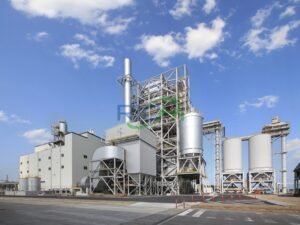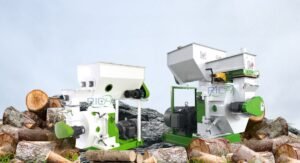
A ring die wood pellet machine is a specialized piece of equipment designed to compress sawdust, wood shavings, or other biomass materials into cylindrical pellets. These pellets are typically used as fuel for heating, cooking, or even in industrial energy production.
The core components of a ring die pellet mill include the ring die itself, rollers, a feeder, and a conditioner. Each component plays a crucial role in the pelletizing process.
The ring die, a circular structure with numerous tiny holes, rotates and facilitates the movement of raw material through the compression channels. Rollers exert pressure, forcing the material through the holes to form uniformly sized pellets. Feeding mechanisms ensure consistent material flow into the machine, while conditioning units pre-treat the biomass to improve binding and pellet quality.
Functionally, ring die wood pellet machines are known for their high efficiency and capacity, making them suitable for large-scale production. Their ability to produce pellets with a uniform density and shape is particularly advantageous for commercial and industrial applications.
In contrast, flat die pellet machines, which feature a stationary circular die and rotating rollers, are generally more suitable for small-scale or home use due to their simpler design and lower output capacity.
The distinctive design of ring die pellet machines allows for continuous operation, significantly reducing operational downtime. As such, these machines are commonly employed in pellet production lines where volume and consistency are critical.
Additionally, the ring die’s robust construction typically results in lower wear and tear, translating into longer service life and reduced maintenance costs compared to flat die pellet machines.
In essence, a ring die wood pellet machine is a vital component in wood pellet manufacturing, delivering high-quality pellets that serve as a renewable and efficient energy source. Whether for heating homes, generating electricity, or providing bioenergy in industrial settings, ring die pellet mills stand out for their durability, efficiency, and output consistency.
Benefits of Ring Die Wood Pellet Machines

When it comes to the production of wood pellets, the ring die pellet machine offers several distinct advantages over alternative methods and technologies. These benefits underscore the efficiency and utility of using a ring die pellet mill for both industrial and commercial applications. Below we discuss the primary benefits associated with employing a ring die pellet machine:
- Improved Efficiency: One of the main advantages of using a ring die wood pellet machine is its enhanced efficiency. The ring die design allows for continuous operation, reducing downtime and optimizing productivity. This ensures that the machine can process a large volume of material in a relatively short amount of time.
- Higher Output Capacity: Ring die pellet mills are known for their ability to produce a higher output compared to other types of pelletizing equipment. This is due to their robust construction and the increased surface area for pelletizing. As a result, businesses can achieve greater production levels, meeting higher demands without compromising quality.
- Better Pellet Quality:The consistent pressure and uniformity provided by a ring die machine lead to superior pellet quality. The pellets produced are denser, more uniform, and have fewer fines, resulting in a product that is more efficient for combustion and easier to handle during storage and transportation.
- Extended Equipment Life:Durability is another key benefit of ring die pellet machines. The rugged construction and high-quality materials used in these machines help in reducing wear and tear, thereby extending the life of the equipment. This longevity translates to fewer replacements and repairs over time, making it a cost-effective option.
- Lower Operating Costs:Due to their efficient operation and long-lasting nature, ring die wood pellet machines generally incur lower operating costs. Energy consumption is optimized, and the need for frequent maintenance is minimized, contributing to overall savings in operational budgets.
These benefits collectively make ring die pellet mills an advantageous choice for anyone involved in wood pellet production, offering a superior balance of efficiency, quality, and cost-effectiveness.
Reasons to Choose a Ring Die Wood Pellet Mill
When it comes to wood pellet production, selecting the appropriate machinery is crucial for obtaining optimal results. A ring die wood pellet mill offers numerous advantages over alternative types. Here, we present an ordered list detailing the key reasons why a ring die pellet mill stands out as the preferred choice:
1. Superior Durability: The ring die pellet machine is known for its robust construction and longevity. Unlike flat die pellet mills, ring die machines are built to handle high workloads and maintain efficiency over extended periods. This durability makes them a cost-effective choice in the long run.
2. Enhanced Heat and Moisture Control: Proper control over heat and moisture levels is fundamental for producing high-quality pellets. Ring die wood pellet machines incorporate advanced technology to maintain optimal conditions during the pelletizing process, ensuring consistent pellet quality.
3. Ease of Maintenance: Ring die pellet mills are designed with accessibility in mind. With straightforward maintenance procedures and readily available spare parts, the downtime for repairs or upkeep is minimized. This ease of maintenance ensures continuous operation and reduces production delays.
4. Scalability for Larger Operations: One of the significant benefits of a ring die wood pellet machine is its scalability. Whether for small-scale production or large industrial applications, ring die machines can be scaled up to meet growing demands, making them ideal for expanding businesses.
5. Energy Efficiency: Energy efficiency is a critical factor in the operational cost of pellet production. The ring die pellet mill is designed to minimize energy consumption while maximizing output. This efficiency not only reduces operational costs but also contributes to environmental sustainability.
Choosing a ring die wood pellet machine encompasses a blend of durability, quality control, ease of maintenance, scalability, and energy efficiency. These attributes make it a superior choice for anyone serious about efficient and effective wood pellet production.
Working Principle of Ring Die Wood Pellet Mills
The working principle of ring die wood pellet mills involves a series of orchestrated steps, each contributing to the overall effectiveness and quality of the pellets produced. Understanding these steps can provide valuable insights into the machinery’s operational efficiency.
- Raw Material Preparation
The process begins with the preparation of raw materials, which typically consists of wood chips, sawdust, or other biomass materials. These materials are ground to a consistent size to ensure uniformity in the pelletizing process. This step is crucial as it directly impacts the efficiency and quality of the pellets produced by the ring die pellet machine.
- Pre-conditioning
Next, the ground raw material undergoes pre-conditioning. During this phase, steam or water is added to adjust the moisture content of the material to the ideal level for pelletizing. This step ensures that the material’s texture is optimal for binding during pellet formation and prevents the ring die pellet mill from becoming clogged.
- Pelletizing
The pre-conditioned material is then fed into the ring die wood pellet machine. Within this machine, rollers press the material through the perforations in the ring die, forming the pellets. The combined pressure and heat generated in this stage are critical as they shape and solidify the pellets. Efficient operation of the ring die pellet mill at this stage is vital for producing high-quality, dense pellets.
- Cooling
Once formed, the pellets exit the machine at high temperatures and are subsequently passed through a cooling system. Cooling helps to stabilize the pellets, reducing their moisture content, and hardening them to prevent them from breaking apart during handling and storage.
- Packaging
The final step involves packaging the cooled pellets for distribution. Proper packaging ensures that the pellets maintain their quality over time and remain protected from environmental factors such as moisture and contamination.
Each of these steps is integral to the efficient and quality-focused operation of a ring die wood pellet machine, ensuring that the final product meets industry standards and user expectations.
When selecting a ring die pellet machine, it is essential to understand the specific parameters that can significantly impact performance and suitability for various applications. Let’s explore these parameters in detail:
1. Production Capacity
The production capacity of a ring die pellet mill is a critical factor to consider, as it determines the volume of pellets produced within a given time frame, usually measured in tons per hour. Production capacity can vary widely depending on the model and design of the machine.
Choosing a machine with the appropriate production capacity ensures operational efficiency and meets the demand for both small-scale and large-scale production targets.
2. Power Requirements
Power requirements typically refer to the amount of electrical energy needed to operate the ring die wood pellet machine. This is usually specified in kilowatts (kW). Higher production capacities generally necessitate larger power inputs.
Understanding power requirements is crucial for ensuring adequate power supply and avoiding operational disruptions. Additionally, aligning power capabilities with production needs helps optimize energy consumption and overall cost efficiency.
3. Die Specifications
The die specifications encompass the diameter and thickness of the ring die. These parameters influence the density and quality of the pellets produced. A larger die diameter allows for higher output levels, while various die thicknesses can cater to different pellet densities.
Selecting the right die specifications is vital for achieving optimal pellet attributes depending on the intended use, be it for fuel, feed, or industrial applications.
4. Pellet Size Options
Pellet size options refer to the diameter of the pellets that the ring die pellet mill is capable of producing, typically ranging from 6mm to 10mm or more. The choice of pellet size is important for meeting specific application requirements, such as animal feed, residential heating, or industrial fuel use. Customizing pellet size can also affect combustion efficiency and transportation logistics.
5. Customization Features
Potential customization features in ring die pellet machines may include adjustable compression ratios, variable speed control, and enhanced cooling systems. Such customization allows for the fine-tuning of pellet characteristics and operational parameters to meet specific production needs.
These features provide flexibility and improve the machine’s adaptability to various raw materials and end-product requirements.
A thorough understanding of these specific parameters is essential for choosing the right ring die pellet machine that aligns with specific operational goals and applications.
Ideal Customers for Ring Die Pellet Machines
Ring die pellet machines cater to various customer segments, each with specific needs and challenges. Below, we identify and describe the ideal customers for these machines:
Large-Scale Wood Processing Plants: These enterprises often generate considerable amounts of wood residues like sawdust, wood chips, and shavings. Investing in ring die pellet mills helps them efficiently convert waste into valuable wood pellets.
This not only enhances their waste management process but also creates an additional revenue stream through the sale of wood pellets. The robust structure and high capacity of ring die wood pellet machines make them ideal for meeting the demands of large-scale production.
Biomass Fuel Manufacturers: Companies dedicated to producing biomass fuel require equipment that can process various materials such as straw, grass, and agricultural residues into uniform, high-quality pellets.
Ring die pellet machines offer the durability and efficiency necessary for continuous, large-scale production. These manufacturers benefit from the machine’s adaptability to different biomass sources, supporting sustainable energy goals and expanding their market reach.
Agricultural Waste Processors: Farmers and agricultural processors often deal with significant volumes of by-products such as corn stalks, rice husks, and other crop residues. Transforming this waste into pellets for use as fuel or fodder can add considerable value.
The reliability and efficiency of ring die pellet mills ensure that these operations can handle seasonal fluctuations in waste volume, maximizing resource utilization and reducing environmental impact.
Animal Feed Producers: Producing high-quality animal feed pellets requires precise processing of ingredients. Ring die pellet machines are well-suited for this task because they ensure uniform pellet quality and allow for the production of various feed formulations.
Their high output and durability make them a preferred choice for large-scale animal feed producers looking to enhance production efficiency while maintaining stringent quality standards.
Each of these customer segments faces distinct challenges that ring die pellet machines are designed to address. These machines provide efficient, high-capacity solutions tailored to meet the diverse demands of industrial-scale operations.
Selecting Richi Machinery as a Supplier
When considering suppliers for ring die wood pellet machines, Richi Machinery emerges as an unparalleled choice. Below, we detail the compelling reasons that make Richi Machinery a preferred supplier in this domain.
- Industry Reputation:
Richi Machinery has garnered a stellar reputation in the industry for its consistent delivery of high-quality ring die pellet mills. Their longstanding presence in the market underscores their reliability and trustworthiness, making them a go-to source for many businesses.
- Quality of Machinery:
Quality stands at the forefront of Richi Machinery’s offerings. Their ring die wood pellet machines are manufactured using premium-grade materials and adhere to stringent quality control protocols. This ensures durability, efficiency, and superior performance, providing great value over time.
- Customer Service:
Richi Machinery is widely acknowledged for its exceptional customer service. From pre-sale consultations to after-sale support, their dedicated team is committed to ensuring client satisfaction at every stage. Their prompt response and tailored solutions greatly enhance the customer experience.
- Technological Innovation:
Innovation is a key driver at Richi Machinery. Their continuous investment in R&D enables them to offer cutting-edge ring die pellet machines equipped with the latest technology. These advancements not only improve operational efficiency but also reduce environmental impact, aligning with modern sustainability goals.
- Positive Customer Testimonials:
The positive feedback from numerous satisfied clients further reinforces the credibility of Richi Machinery. Testimonials highlight the dependability, high performance, and excellent support associated with their ring die pellet mills. These endorsements reflect well on their commitment to quality and customer satisfaction.
In summary, choosing Richi Machinery as a supplier for ring die wood pellet machines is a decision backed by their reputed standing, superior machinery quality, outstanding customer service, innovative approach, and the numerous positive experiences shared by their clients.
Conclusion
In conclusion, it is evident that ring die wood pellet machines offer numerous benefits for efficient and high-quality pellet production. Throughout this comprehensive guide, we’ve explored the fundamental aspects of these machines, highlighting their design, operational efficiency, and versatility.
Ring die pellet mills stand out due to their enhanced durability and ability to produce pellets at a consistent quality, making them an ideal choice for large-scale wood pellet production.
One of the key advantages of using a ring die wood pellet machine is its superior ability to handle high volumes of raw materials with minimal maintenance. By understanding the specific parameters such as moisture content, particle size, and compression ratio, operators can maximize their machine’s performance and longevity. These parameters are crucial for ensuring the production of high-density pellets that meet industry standards.
Moreover, when choosing a ring die pellet machine, opting for a reliable supplier like Richi Machinery can significantly impact your production efficiency. A trustworthy supplier provides not only high-quality machines but also comprehensive support and service, which is essential for maintaining optimal performance over time.
With their expertise and range of products, Richi Machinery stands out as a leader in the industry, ensuring that customers receive the best value for their investment.
Ultimately, investing in a ring die wood pellet machine is a strategic decision that can lead to significant economic and operational benefits. By focusing on machine quality, understanding essential parameters, and partnering with reputable manufacturers, businesses can achieve superior pellet production outcomes.
The outlined considerations and insights serve as a valuable resource, equipping readers with the knowledge needed to make informed choices in the realm of wood pellet production.






